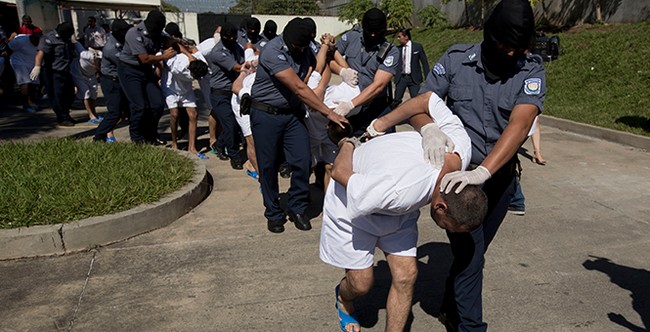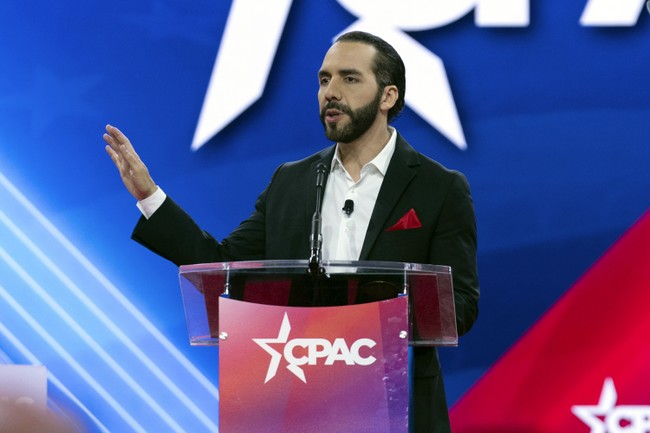I am, generally speaking, very much a civil libertarian. I believe in due process, would be a tough juror in a difficult case, and very leery of government overreach.
I strongly support the police–when they are unfairly criticized. But I have no illusions that putting the power of the state into the hands of unaccountable individuals is very dangerous, and I believe that law enforcement bears watching. Power corrupts.
With all that said, I think that President Bukele of El Salvador has a very important lesson to teach us: civil rights only exist where law and order do.
Salvadoran President Nayib Bukele’s crackdown on street gangs has facilitated a dramatic drop in crime—but it has also come at a serious cost to democracy and human rights, writes @Gustavo_F_M. https://t.co/V0hi2l6nYD
— Foreign Affairs (@ForeignAffairs) March 20, 2024
Lots of people–most notably people who live in comfort and safety–are very upset about Nayib Bukele’s massive crackdown on criminal gangs in El Salvador, and it is easy to see why. From a distance, all we can see is the photos in which young men are harshly treated and stuffed into massive prisons.
It’s the opposite of how crime is treated in Blue cities.

Under President Nayib Bukele, El Salvador has experienced one of the most spectacular declines in violent crime in recent memory, anywhere in the world. Despite ranking among the most dangerous countries on the planet a mere decade ago, the Central American state today boasts a homicide rate of only 2.4 per 100,000 people—the lowest of any country in the Western Hemisphere other than Canada.
El Salvador owes much of its dramatic drop in crime to Bukele’s crackdown on street gangs and criminal organizations, including MS-13 and Barrio 18. Although homicide rates were trending downward before Bukele took office in 2019, violent crime declined sharply after March 2022, when his government declared a state of emergency following a spike in murders, allowing the government to suspend basic civil liberties and mobilize the armed forces to carry out mass arrests. This state of exception granted Bukele’s administration a blank check to fight gangs and detain suspects without consideration for transparency, due process, or human rights.
Bukele has managed to accomplish something that once seemed impossible: make El Salvador a safe place–safer than the United States of America.
Most people don’t know this, but no place in the world is more dangerous, at least in regard to murder, as in Latin America. And El Salvador was the worst of the worst.
Not anymore.
Bukele’s iron-fist measures and their apparent results have not only made him wildly popular in his country—earning him a landslide reelection in February 2024—but also captured the imagination of politicians elsewhere grappling with rapidly deteriorating public safety. Members of the political elite in other states are now toying with the so-called Bukele model. In Ecuador, for instance, President Daniel Noboa has unabashedly followed in Bukele’s footsteps in response to prison riots and a major surge in homicides, declaring a state of emergency in January that gave the armed forces free rein to detain suspects and to take over control of the country’s prisons. The Bukele-style security measures appear to be succeeding there, as well: a little over a month into the crackdown, the government reported that the daily average of homicides had fallen from 28 to six. The fact that militarized public safety campaigns are proving effective outside El Salvador has only enhanced the model’s growing appeal across Latin America, which has long suffered the highest rate of violence of any region in the world.
Militarized policing in a functioning society is a terrible idea; in a society on the brink of collapse, it is the only idea worth considering. It’s one of the reasons we call out the National Guard after natural disasters–when society breaks down, order must be restored.
It turns out that civil rights require civilization, and civilization doesn’t exist if violent gangs dominate society. The first duty of government is to establish order, and the second is to protect freedom and property.
You can’t have the latter without the former, and Bukele is popular because he has created the space for a genuine civil society to take root.
Obviously, as attractive as the results Bukele has produced, we don’t know if the seeds of civil society will take root in El Salvador. With so much power in the hands of so few, the danger of a growing tyranny is clear. On the other hand, El Salvador was already living under a tyranny in which nobody but gang members had any rights at all.
But as appealing as a Bukele-style crackdown might seem, these punitive campaigns against organized crime come at a serious cost to democracy and human rights. These measures concentrate power in the hands of the executive, chipping away at other democratic institutions, such as Congress and the judiciary, that are critical bulwarks against governmental abuse. They also fail to solve the underlying problems, such as corruption and impunity, that generate such violence and instability in the first place.
I am skeptical, though, of the “root causes” argument because it ignores that one of the significant root causes is lawlessness itself. In a lawless society, as El Salvador was, violence and instability are inevitable. Establishing order is insufficient to build a good society, but it is a necessary precondition.
Worries about Bukele’s potential to become a dictator are not without merit, but they are also without much evidence (yet) to back them up. And, at the moment, pious pronouncements about how he is eroding democracy and/or government accountability are laughable. There were neither prior to Bukele because El Salvador was essentially a failed state.
Although Bukele’s crackdown has achieved spectacular public safety gains, it has incurred an equally sizable but less visible cost to El Salvador’s democracy. In the short term, the mass arrests have led to the incarceration of tens of thousands of people who lack legal recourse, with many Salvadorans living in fear of arbitrary imprisonment. In the long run, Bukele’s consolidation of power undermines the system of institutional checks and balances that safeguard the public against government abuse. Ahead of the country’s February elections, for instance, Bukele used the suspension of constitutional rights to modify El Salvador’s electoral rules to favor his party. Moreover, the normalization of states of emergency and the militarization of public life erodes citizens’ ability to influence policy, and it weakens trust in the capacity of civilian institutions to solve the country’s problems.
Despite these high costs, public safety has become such an overriding concern for so many Salvadorans that civil liberties and human rights have been sidelined. As Bukele’s enduring popularity demonstrates, if violent crime is severe enough people are willing to relinquish protections against government abuse in exchange for improved public safety.
So far what we have seen in El Salvador is the societal equivalent of a treatment for Stage 4 cancer. If a doctor told you that he was going to cut you open, yank out a chunk of your body, and then flood your system with poisons you would balk.
But if he told you that this was the only way to cure you of a fatal disease, you would probably prefer the bad solution to the worse outcome. Cut me open doc, I don’t want to die.
El Salvador was on the brink of death; Bukele has given the country a shot at life.
Will the body heal, or will a different disease take the place of the cancerous violence that once dominated the country?
We don’t know yet. But there is a lesson for civil libertarians looking to El Salvador: if you want to preserve civil liberties, you have to preserve civilization first. Nobody cares about notional rights that mean nothing because you are getting robbed, shot at, and bullied by gangs.
Chicago, take note.











